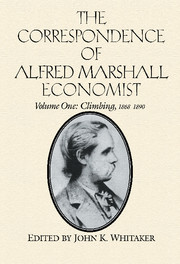Book contents
- Frontmatter
- Contents
- Acknowledgements
- General Introduction
- Editorial Practices
- Alfred Marshall: A Sketch
- Abbreviations
- List of Manuscript Collections
- Biographical Register
- Chronology 1842–1890
- List of Letters Reproduced in Volume 1
- LETTERS 1–332
- Appendices
- I Alfred Marshall's Family
- II Marshall's Testimonials for the Principalship of University College Bristol, June 1877
- III Foxwell's Initiative
- IV The 1889 Debate on Reform of the Moral Sciences Tripos
I - Alfred Marshall's Family
Published online by Cambridge University Press: 29 March 2010
- Frontmatter
- Contents
- Acknowledgements
- General Introduction
- Editorial Practices
- Alfred Marshall: A Sketch
- Abbreviations
- List of Manuscript Collections
- Biographical Register
- Chronology 1842–1890
- List of Letters Reproduced in Volume 1
- LETTERS 1–332
- Appendices
- I Alfred Marshall's Family
- II Marshall's Testimonials for the Principalship of University College Bristol, June 1877
- III Foxwell's Initiative
- IV The 1889 Debate on Reform of the Moral Sciences Tripos
Summary
Family matters enter only tangentially into Marshall's surviving correspondence, so that an abbreviated description of the pertinent individuals and their relationship to him is all that seems needful here.
Marshall's parents, William Marshall (1812–1901) and Rebecca Marshall née Oliver (1817–78) were married in 1840 and had five children. Alfred, who was born on 26 July 1842, was the second. The oldest son, Charles William born in 1841, left for India at age 17, returning later in life to settle in England at Bathford. Agnes, born 1845, went out to India sometime after 1875 to assist her brother Charles. She died there relatively young, perhaps in 1884. Alfred's younger sister, Mabel Louise, born in 1850, lived until 1912, while the fifth sibling, Walter, born in 1853 died of tuberculosis in South Africa in 1874 before completing his studies at Cambridge, where he had been a member of Peterhouse.
Charles Marshall married Lucy Guillebaud and had two sons, William who became a doctor and Arthur who died of wounds received in the First World War. Mabel Louise married Erneste Guillebaud (1856–1907), brother of Lucy. A student at Cambridge, where he had been a member of Trinity (BA 1881), he served as Rector of Yatesbury, Wiltshire, from 1889 until his unexpected death in 1907. William Marshall lived with them there in his latter years as a widower.
The Guillebauds had four sons. The oldest, Harold (1888–1941), read classics at Cambridge 1907–10 (Pembroke) and was then dragooned by his uncle into a further year studying economics. He became a churchman and missionary, serving for some years in Rwanda.
- Type
- Chapter
- Information
- The Correspondence of Alfred Marshall, Economist , pp. 351 - 353Publisher: Cambridge University PressPrint publication year: 1996



